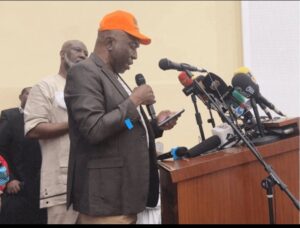
In a bold and unprecedented move, the entire leadership of the African Democratic Congress (ADC) has officially resigned from their positions at all levels to make way for a broader opposition coalition aimed at rescuing Nigeria ahead of the 2027 general elections.
Announcing the development on Tuesday, the party’s National Chairman, Ralph Okey Nwosu, said the mass resignation was a sacrificial step taken in the national interest to provide an open and inclusive political platform for a united front against the ruling All Progressives Congress (APC).
“This is not the time for ego or self-preservation,” Nwosu declared. “The entire ADC leadership at all levels has voluntarily stepped aside to allow a credible, people-driven coalition to emerge — one that can rescue Nigeria from the brink and restore hope to millions.”
The dramatic development follows the ADC’s recent unveiling of key political figures — including former Senate President David Mark and ex-Osun State Governor Rauf Aregbesola — as part of a proposed alliance to challenge the Tinubu administration in 2027.
Nwosu emphasized that the party’s decision reflects its deep commitment to national unity and democratic renewal, stressing that Nigeria is at a critical crossroads that demands bold, selfless leadership.
“This platform is now open to all patriots — opposition leaders, technocrats, youth movements, and civil society — who believe that Nigeria can no longer afford to continue on this destructive path,” he added.
Reactions to the move have been swift, with many political observers hailing it as a strategic masterstroke that could reinvigorate opposition politics and shift the momentum ahead of the next election cycle.
As consultations intensify, the ADC’s former leadership will now act as facilitators and advisors to the emerging coalition, expected to crystallize in the coming months.
With this move, the ADC has become the first major political party in Nigeria to completely dissolve its leadership structure in favour of a national unity front — a move that could potentially reshape Nigeria’s political landscape heading into 2027.




